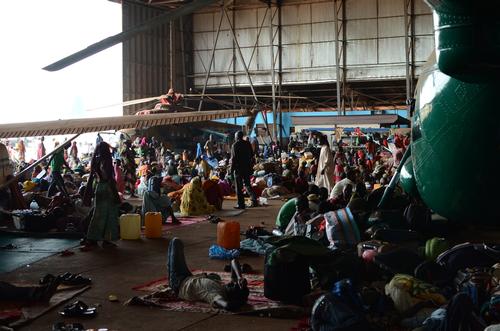From 22 to 24 March, heavy fire from automatic weapons and grenade explosions were heard around the PK5 and PK12 neighbourhoods in Bangui, the capital of Central African Republic (CAR). MSF teams treated 38 wounded, three of whom died of their injuries.
Thousands of Muslims have been trapped for several weeks in these neighbourhoods, with international forces attempting to protect them from attacks by anti-balaka militias.
'violence is not over'
“These renewed attacks show that the violence in Bangui is not over yet, despite the continued presence of international forces,” says Hakim Chkam, MSF’s head of mission in CAR. “Following the clashes, MSF treated 38 wounded. Most of the injuries were caused by bullets, grenade shrapnel and machetes.”
An ambulance service was set up to transport patients from PK5 and PK12 to the city’s General Hospital, where MSF is supporting emergency surgical services. However, insecurity is hampering efforts to transport the wounded and provide emergency aid.
Emergency care continues
A skeleton MSF team continued to provide emergency medical care in Mpoko camp for displaced people, situated at the international airport and close to the PK5 neighbourhood. Within 24 hours, the team treated 15 people wounded in the violence and referred three of the most serious cases to the General Hospital. However, MSF suspended regular medical consultations for the 60,000 displaced people who are sheltering in Mpoko camp in desperate conditions.
“With each new outbreak of violence, more people flee back to the camp or to new areas in Bangui,” says Chkam. An MSF team will assess the needs of people who fled the most recent attacks and have sought refuge in the St Jacques, Bimbo and Carriere neighbourhoods of Bangui.
MSF has been working in CAR since 1997. Currently MSF has more than 300 international staff and more than 2,000 Central African staff working in the country. MSF is running seven regular projects (in Batangafo, Carnot, Kabo, Ndélé, Paoua, Bria and Zémio) and eight emergency projects (in Bangui, Berbérati, Bouar, Boguila, Bossangoa, Bangassou and Bocaranga as well as mobile clinics in the northwest of the country). MSF teams are also providing assistance to Central African refugees who have fled to Chad, Cameroon, Democratic Republic of Congo and Congo-Brazzaville.



